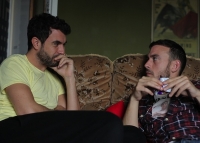 By Brian Lafferty
By Brian Lafferty
October 14, 2011 (San Diego) – Weekend is not to be confused with the 1967 Jean-Luc Godard film by the same name. This Weekend, a British import, is in some ways like a Henry Jaglom film in that it’s high on the dialogue meter and all about relationships. What separates Weekend from Henry Jaglom’s films are that it isn’t self-indulgent, it’s an honest portrayal of relationships, and the characters and conversations are worthy of my time and yours.
Weekend has the barest of plots, but writer and director Andrew Haigh manages to get a lot of mileage out of it. Tom Cullen is a gay man named Russell who meets Glen (Chris New) at a nightclub. The two have a one-night stand, after which Tom falls in love with him. He learns that Glen will be leaving for Portland, Oregon and will in all likelihood never see him again. The two spend the weekend before his trip to the States talking about life, sex, relationships, and gay issues.
The movie's format involves Haigh throwing lots of stuff at the screen and seeing what sticks. Most of the time his aim is accurate and a majority of what sticks provokes much thought. Sometimes my interest waned as the film sagged in spots. Whenever it did, however, the format offered an entry point for me to jump back in with ease.
Cinematographer Urszula Pontikos’s lightly handheld camerawork doesn’t add realism. What it does provide is an opportunity to make one feel like a participant. Pontikos positions the camera just slightly higher than normal and uses a variety of smooth tilts and pans to reveal certain details. It’s similar to how we look up, down, and sideways. The handheld camera brings immediacy to the picture and an intimate glimpse into the lives of Russell and Glen.
Writer Haigh crafts a script loaded with fruitful conversations about sex, relationships, and gay issues, which he then peppers with sexually explicit dialogue. Some of it is superficial, particularly when they discuss the hypocrisy between the way heterosexual and homosexual relationships are viewed by the average person. The rest of it is thoughtful and intelligent.
The only major issue that plagues Weekend doesn’t have anything to do with the actual film. The dialogue is English but the thick British accents and the actors’ tendencies to speak in soft, low voices make a portion of the dialogue hard to understand for American audiences. Maybe the distributor was afraid to put in subtitles, thinking that the mere notion would alienate people who have an aversion to them.
Even so, it’s not essential to hear every line of dialogue. I didn’t feel deprived, although some people may be pickier despite the fact that Weekend doesn’t hinge on every line of dialogue. On its surface, it looks like a whole lot of nothing. But when you add everything up, you can see the entire picture. Still, it would have been nice to at least have a chance to hear everything.
Weekend contains some sex, namely a handjob and oral sex, but it doesn’t seek to push the envelope or push any buttons. It doesn’t break any new ground in gay issues or gay relationships in cinema. It does make us view sex and interpersonal relationships from a perspective that either we never thought of before or rarely think of. By having the relationship be between a man and a man, he shows us that such relationships and the issues encountered are not any different than those between a man and a woman.
Weekend is now playing at the Landmark Hillcrest Cinemas.
An IFC Films release. Director: Andrew Haigh. Screenplay: Andrew Haigh. Cinematography: Urszula Pontikos. Original Music: James Edward Barker. Cast: Tom Cullen and Chris New. 97 minutes. Unrated.
Brian Lafferty can be reached at brian@eastcountymagazine.org. You can also follow him on Twitter: @BrianLaff.







Recent comments